Daughter Miserable After Her Parent Kicked Her Out Of The House But Kept All Of Her Cats
Being obsessed with something is never a good thing. When an obsession becomes unhealthy, it can ruin your life and prevent you from achieving your dreams.
People are usually unable to recognize when they start to become obsessive, and even when they do, they downplay it and allow that obsession to grow even more. It's not easy to let go of an obsession, and most people typically need professional help and rehabilitation.
It's crucial to recognize that you have an obsession and need help because it's extremely hard to make someone acknowledge their own unhealthy obsessions. That's why some people often need another person to help them realize something about themselves.
A Redditor who goes by the username u/eiooq made a post on the r/AmItheA**hole subreddit where they explained how they threw their daughter out but decided to keep her cats. The user's daughter is obsessed with cats, and her obsession is one of the main reasons why they decided to kick her out.
The user received a lot of different reactions to their post; scroll down to check out the full Reddit post, and scroll a little further to read the top comments from the original post.
Here's the original post by Reddit user u/eiooq:
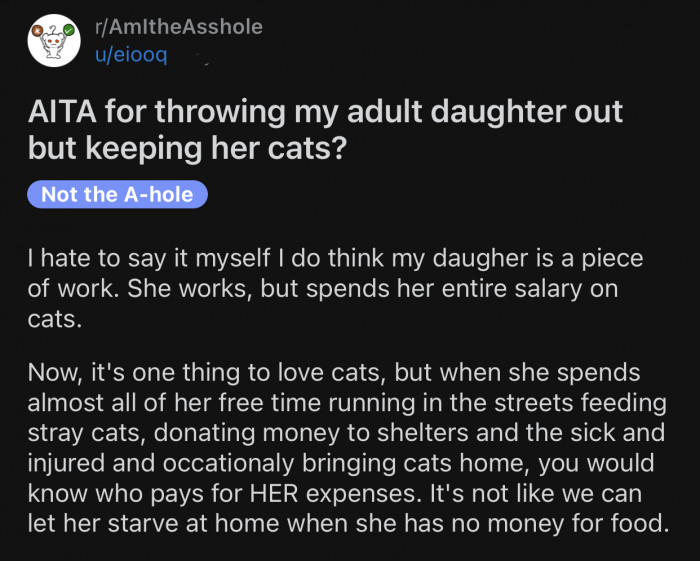
Despite all her charitable work, OP's daughter doesn't spend money on the cats she adopted.
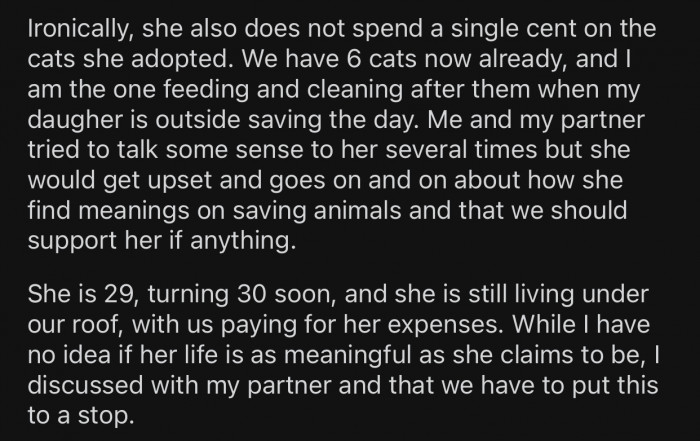
OP informed their daughter that she has until October to move out.

The Psychological Impact of Pet Ownership
Dr. Nathaniel Carter, a clinical psychologist at Oxford, notes that pet ownership can significantly influence emotional well-being.
Research indicates that individuals often form deep emotional attachments to their pets, which can lead to strong feelings of loss and grief when situations change.
Understanding the psychological implications of these attachments is crucial, especially in the context of family dynamics.
The Emotional Toll of Pet Ownership
The anguish of being separated from pets can be profound, especially when financial constraints complicate the situation. According to Dr. Dan Gilbert, a happiness researcher, "The emotional bonds we form with our pets can mirror those we have with family, leading to significant feelings of loss when they are taken away." This sentiment is echoed by Dr. Ross Greene, a child psychologist, who states, "Understanding the complexities of attachment in pet ownership is essential for navigating the emotional turmoil that can arise in such situations." The Redditor's daughter's experience highlights the intricate balance between attachment and responsibility in pet ownership.
Recognizing these emotional dynamics is crucial in addressing the conflict between financial realities and emotional needs.
OP's daughter felt miserable because of their decision, which made OP doubt their judgment.

Here's how the Reddit community reacted to u/eiooq's post:

Feeding strays isn't as good as people think.

Studies show that losing access to pets can evoke feelings similar to those experienced during the loss of a human loved one.
This can lead to a complex grieving process, particularly when feelings of abandonment arise.
Recognizing these emotional responses can facilitate healthier coping strategies during times of change.
This situation also highlights the challenges of prioritizing self-care versus financial obligations. Studies indicate that many individuals who struggle with budgeting often experience heightened stress and emotional turmoil. In this case, the daughter's intense focus on caring for her cats may reflect an effort to cope with her own emotional challenges, yet it also raises questions about financial responsibility.
The daughter has a serious problem and needs therapy.

The daughter will most likely get more cats after she moves out.
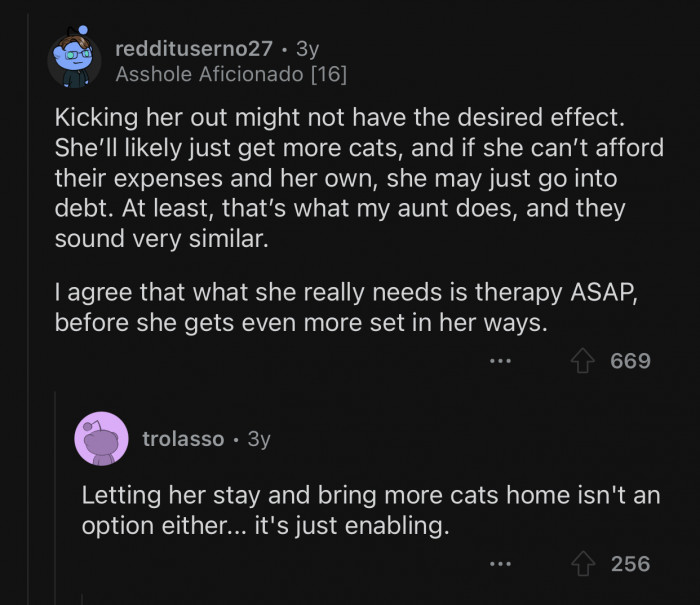
The daughter's behavior is obsessive, and she needs some help.
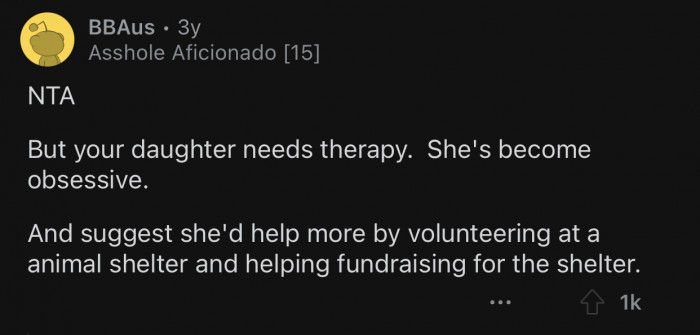
Navigating Relationships and Attachment
This situation highlights the complexities of familial relationships and attachment styles.
Research suggests that individuals with anxious attachment styles may struggle more with feelings of loss and abandonment when separated from their pets.
Understanding one’s attachment style can provide insight into emotional responses and help manage feelings of grief.
Navigating Family Relationships and Responsibilities
To balance emotional needs with practical responsibilities, open communication within the family is vital. Engaging in discussions about expectations and financial limits can help alleviate misunderstandings. Research shows that families that foster healthy communication are better equipped to navigate conflicts and support each other through difficult times.
Encouraging the daughter to explore alternative solutions, like seeking assistance from local animal shelters or adopting a budget-friendly approach to pet care, can help her manage her responsibilities without sacrificing her emotional well-being.
The stray population in OP's area must be booming.

The daughter has a good heart, but she needs help.
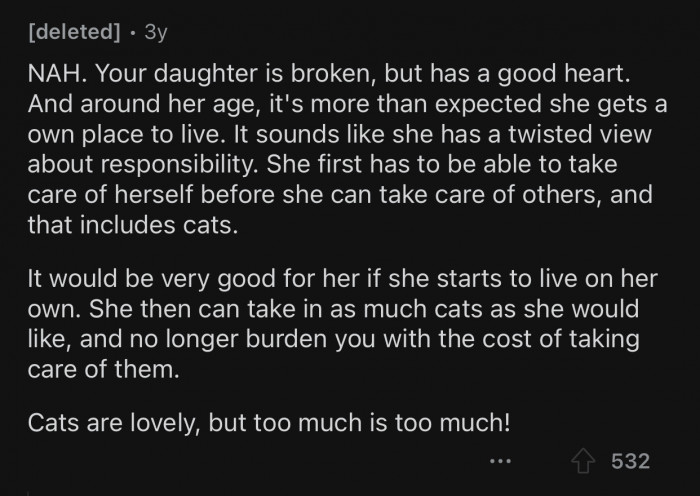
She kept chasing the feeling and got lost along the way.
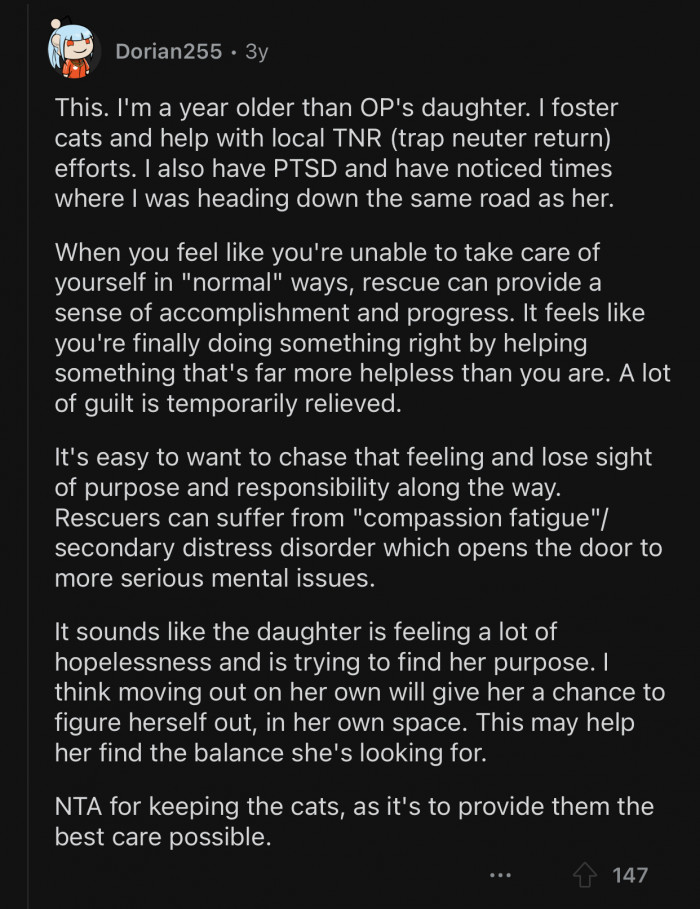
To navigate these emotional challenges, encouraging open communication within the family is essential.
Discussing feelings of loss and attachment can create a supportive environment for healing.
Practicing empathy towards each other’s experiences can foster understanding and strengthen family bonds.
Additionally, seeking professional guidance or counseling may help individuals navigate these emotional challenges more effectively. Therapy can provide a safe space for individuals to express their feelings and develop healthier coping strategies. This approach can also facilitate discussions about responsibilities and emotional well-being within the family.
OP's neglecting their daughter's mental health.
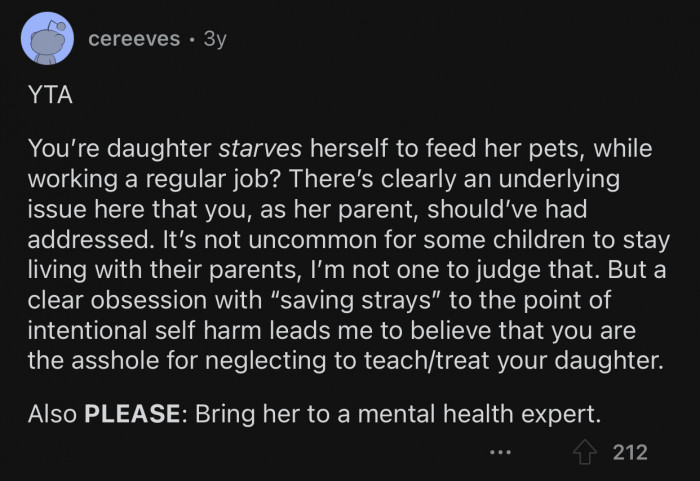
OP and her spouse are paying for the daughter's expenses.

"Your daughter is an animal hoarder."

Coping Strategies for Grief
Developing effective coping strategies is vital for managing grief associated with pet loss.
Research indicates that engaging in memorial activities, such as creating a scrapbook or holding a small ceremony, can help individuals process their feelings.
These activities can provide a sense of closure and facilitate healing.
Outdoor cats lead to hundreds of strays.
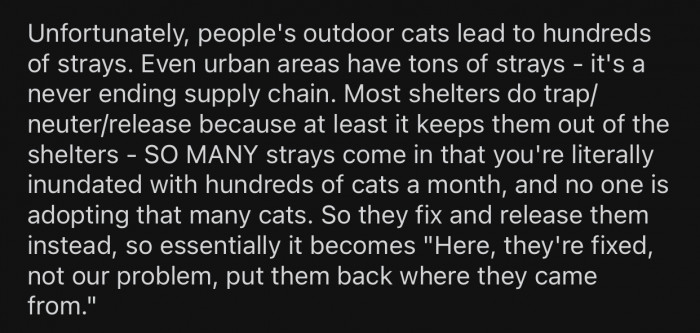
OP's daughter is wasting her time and money. She will become broke because of this.

OP's daughter really needs to get some therapy. Her behavior is definitely not normal.
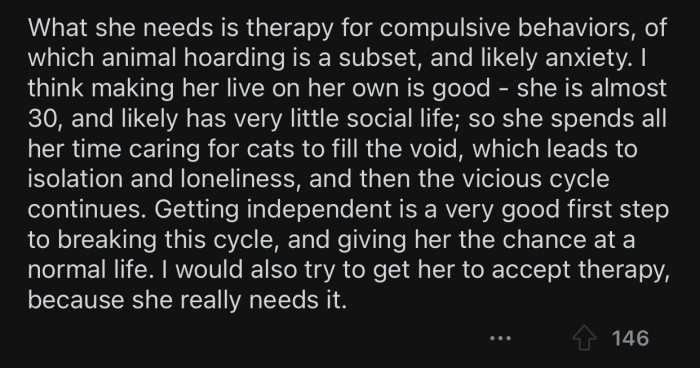
Encouraging family members to share their memories of the pet can also foster connection and healing.
Creating opportunities for shared grieving experiences can help individuals feel less isolated in their feelings.
By honoring the pet's memory together, families can strengthen their emotional bonds.
You need to be able to afford a cat before getting one. Otherwise, you shouldn't get one.
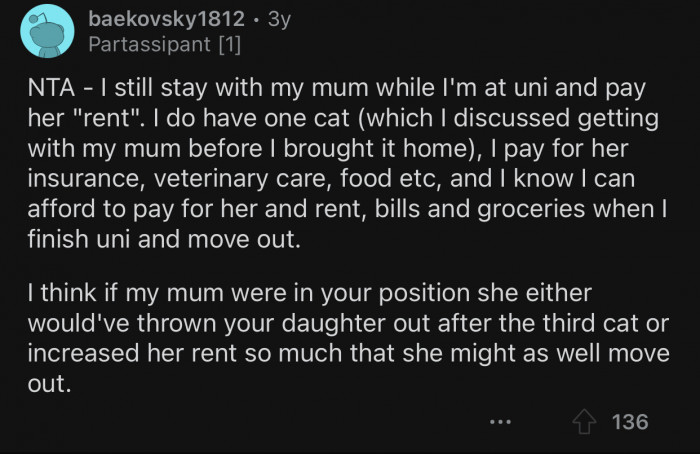
OP should not take her daughter's cats.
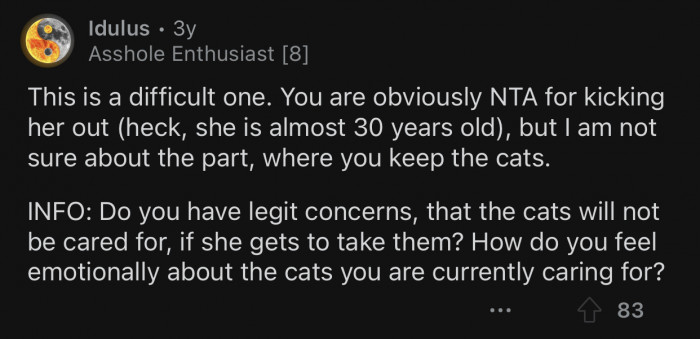
The daughter will starve herself but feed the cats.
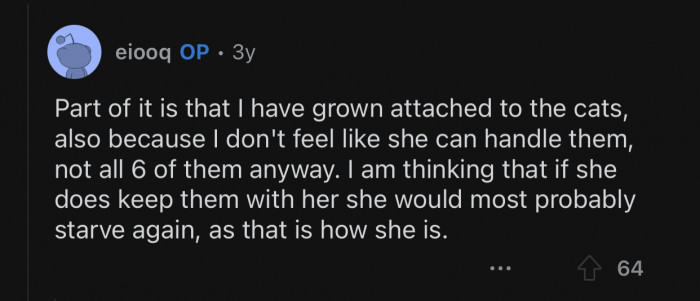
The Role of Emotional Resilience
Building emotional resilience is crucial during times of loss and change.
Research shows that individuals who cultivate resilience are better equipped to handle grief and navigate complex emotional landscapes.
Encouraging family members to engage in self-care practices can enhance emotional well-being and foster resilience.
OP's daughter needs some serious therapeutic support because her behavior is definitely not normal. There's nothing wrong with being a hardcore cat lover, but when it becomes an obsession that keeps you from advancing in life, you need to realize that you require some help.
If you enjoyed reading this story, make sure to check out similar content on our platform.
Psychological Analysis
This situation illustrates the emotional bond people can have with their pets, leading to conflicts when financial responsibilities arise. Understanding these dynamics is essential for fostering communication and navigating family relationships effectively.
Analysis generated by AI
Analysis & Alternative Approaches
The emotional complexities of pet ownership highlight the need for open dialogue and understanding in family dynamics. Research supports the idea that fostering healthy communication and exploring alternative solutions can help address conflicts surrounding responsibilities. By prioritizing emotional well-being alongside practical needs, families can navigate these challenges more successfully.
Implementing mindfulness practices, engaging in physical activity, and seeking professional support can all contribute to building resilience.
Creating a family culture that prioritizes emotional health can help individuals cope more effectively with loss.
Ultimately, fostering resilience can create a more supportive environment for everyone involved.
Creating a Supportive Environment
Establishing a supportive family environment is essential for navigating the emotional challenges of pet loss.
Research indicates that families who engage in open discussions and shared grieving experiences tend to recover more effectively from loss.
Creating a culture of support and understanding can facilitate healing and strengthen family bonds.
Analysis & Alternative Approaches
In conclusion, understanding the psychological impacts of pet ownership and loss is essential for fostering emotional well-being within families.
By encouraging open communication, shared grieving experiences, and resilience-building strategies, families can navigate the complexities of these emotional challenges more effectively.
Creating a supportive environment can lead to healing and strengthen familial bonds during difficult times.



